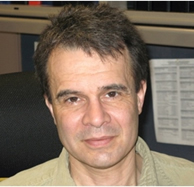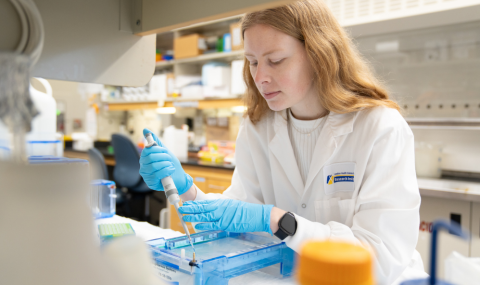Scientist: Verspeeten Family Cancer Centre, London Health Sciences Centre
Associate Professor:
Department of Oncology, Western University
Cross Appointments: Departments of Oncology and Biochemistry
Mailing Address
Cancer Research Laboratory Program
Verspeeten Family Cancer Centre, London Health Sciences Centre
Room A4-915
790 Commissioners Rd. E.
London, Ontario Canada N6A 4L6
Tel: 519-685-8600 Extension 58692
Email: jtorchia@uwo.ca
University Website:
Research Area
Epigenetic Regulation and Cancer
Key Words
Transcription, gene regulation, chromatin, histones, nuclear hormone receptors, breast cancer
Research Summary
Research in my lab is dedicated to understanding how epigenetic-dependent changes in chromatin structure affects gene expression and cancer development. Epigenetic regulation of gene activity constitutes mechanisms which cause changes in gene expression without alterations in the DNA sequence. This is best exemplified during embryonic development where a single cell differentiates into numerous cell types such as neurons, muscle, epithelial and blood cells. In each case, the cellular phenotype that is passed on during cell division is defined not by changes in the DNA sequence, but by the chemical modification of DNA and histones. Mounting evidence supports the notion that deregulation of epigenetic gene expression is causally linked to cancer. For example, transcriptional silencing of tumour suppressor genes by hypermethylation is a hallmark feature of cancer progression. Epigenetic changes can also occur upon exposure to environmental toxins and dietary constituents, and may be primarily responsible for population variation relevant to disease risk. We are utilizing biochemical, molecular and transgenic approaches in order to understand the mechanisms that control gene regulation in the hopes of defining new strategies by which one can modify epigenetic responses to signalling pathways in cancer.
Laboratory
Our focus is on the fundamental mechanisms of eukaryotic gene regulation. We are combining biochemical and molecular biological strategies with techniques in mass spectrometry, and in vivo transgenic analysis, to understand how gene expression is regulated within the context of chromatin and how these processes relate to human diseases such as Cancer.
Staff and Trainees
Majdina Isovic, Research Technician
Email: mbambego@uwo.ca
Haider Hassan, Post-Doctorate Associate
Bart Kolendowski, PhD Graduate Student, Department of Biochemistry
Current Projects
Applying Functional Proteomics and Genomics to analyze transcriptional response program in Cancer.
We have recently purified a transcriptional complex known as ZNF217. ZNF217 is a Kruppel-like zinc finger protein which is located on chromosome 20q13.2, within a region of recurrent maximal amplification. Studies using primary breast cancer cell lines and tumours have demonstrated a strong correlation between the amplification of 20q13.2, high levels of ZNF217, and aggressive tumour behaviour. We have shown that ZNF217 functions as a transcriptional repressor and using protein purification techniques in combination with mass spectrometry, we have purified a ZNF217 protein complex. The ZNF217 complex contains several enzymes involved in the covalent modification of chromatin including the recently discovered lysine demethylase LSD1. More recently we have combined (1) genetic ablation of ZNF217 using siRNA in conjunction with genome wide expression profiling, and (2) chromatin immunoprecipitation with promoter DNA microarrays (known as ChIP on ChIP) to identify genes directly regulated by ZNF217. Importantly, from our preliminary analysis we have identified the first known targets of a human ZNF217 complex several of which play a direct role in tumour biology. Collectively these studies will provide a mechanistic understanding of the cellular pathways through which ZNF 217 functions and provide a better understanding of how ZNF217 may promote tumourigenesis.
Molecular Dissection of Steroid Hormone Signalling Pathways
Steroid hormones play critical roles in regulating the growth and function of the reproductive, cardiovascular and skeletal systems. The actions of these hormones are mediated through a superfamily of nuclear receptor proteins which function as ligand-regulated DNA binding transcription factors. Members of this family include receptors for estrogen, glucocorticoids, nonsteroidal ligands (e.g. thyroid hormone, retinoic acid) and by-products of lipid metabolism (e.g. fatty acids and prostaglandins). These receptors control transcription of genes that play critical roles in many aspects of development and adult physiology, including cell proliferation and differentiation, metabolism, morphogenesis, as well as programmed cell death. In addition, aberrant steroid hormone signalling pathways have been linked to human diseases such as breast cancer.
It is well established that hormone binding triggers a specific conformational change in the receptor that facilitates the recruitment of coactivator proteins. Coactivators are essential mediators of NR activity and function by (1) modifying the chromatin environment to alter the effects imposed by packaging DNA into chromatin, or (2) regulating the assembly of the preinitiation complex by interacting directly with components of the core transcriptional machinery. We have identified a steroid hormone coactivator known as p/CIP. P/CIP is an oncogene and is amplified and overexpressed in a significant percentage of primary breast and ovarian tumours, suggesting that the relative levels of p/CIP may be a critical determinant of normal growth and development. p/CIP is rapidly recruited to estrogen receptor target genes in response to hormone, and activates transcription by facilitating the assembly of a multiprotein complex consisting of various enzymes which covalently modify chromatin. We are utilizing biochemical and molecular approaches in order to understand the mechanism of action of p/CIP and how p/CIP may promote tumourigenesis in cancer.



